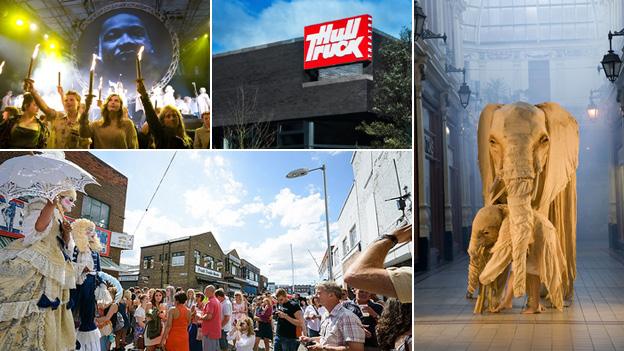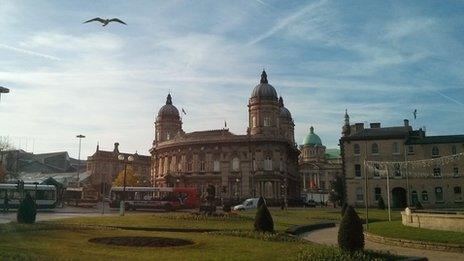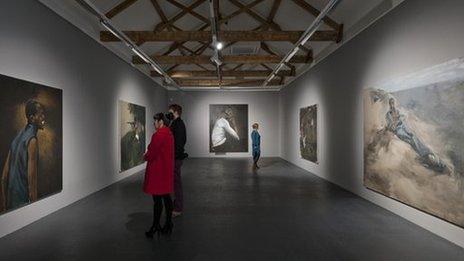'Tucked away' Hull hopes for City of Culture success
- Published

Hull will host more than 1,500 events including 25 festivals if it wins the title
Hull is making its final push to be named the UK City of Culture 2017 as it presents its bid to the judges in Londonderry, along with Leicester, Dundee and Swansea Bay.
But with the massive expense involved in winning the accolade at a time when the council is having to make more than £40m of budget cuts, why does Hull want the title?
The bid team has promised to spend £15m to provide 365 days of cultural activities - including 25 different festivals, an "aerial spectacular", and 12 artists' residencies.
But this is not just about providing a year's worth of entertainment. That might be hard to sell to a city where 20,000 people are out of work, libraries are closing and council tax is going up.
The team claims securing the accolade could generate an extra £184m for the East Yorkshire city over five years.
The £15m budget would be underwritten by Hull City Council, which has so far received sponsorship pledges from 20 local companies.
"We've got to invest," says councillor Stephen Bayes.
"It's about investing, building and supporting the development of an infrastructure. People will feel more proud of where they live and it will create jobs and employment.
"It's also about perceptions - in Liverpool and Glasgow perceptions have changed."

Hull's plans include an "aerial spectacular" created by Mark Murphy, director of the 2014 Commonwealth Games closing ceremony
The UK City of Culture title was created following the success of Liverpool's year as European Capital of Culture (ECoC) in 2008.
A report, external commissioned by Liverpool City Council found the city had 9.7 million more visitors than normal that year, generating an extra £735m in additional visitor spend across Merseyside.
Crucially perhaps for Hull, it also dramatically changed attitudes. The researchers found positive stories about Liverpool in the national press grew by 71% before and during its year in the spotlight.
And this is why Diana Johnson, Labour MP for Hull North, wants to win.
"A lot of people have an old-fashioned view that Hull's a place where there's fish and a port," she said.
"I want visitors to come to the city and see everything it's got going for it. Everyone who visits attractions like The Deep [aquarium] enjoys it, but we need more visitors."
She said part of the problem was inevitably the city's somewhat isolated location.
"We are tucked away. You don't go through Hull to get anywhere else."

Diana Johnson said she wanted to change "old-fashioned" views of Hull
And that is something Hull has in common with the current UK City of Culture, Derry, in Northern Ireland. The woman who led its successful bid, Shona McCarthy, has said the city has received a five-fold economic return on its £16m investment so far.
Being City of Culture has brought Derry events like the Turner Prize and BBC Radio 1's Big Weekend.
But income from sponsorship and ticket sales has failed to live up to expectations, and there have been tensions among organisers.
Dr Dave O'Brien, from City University London, has written several papers about Liverpool's experience as ECoC. He said contenders for the title needed to be cautious.
"The idea that you can just host an event for a year and suddenly have a new economy, have lots of new hotels, lots of new shops, you'll be able to move from manufacturing to culture creative industries and tourism - that just isn't the case.
"It needs much longer term forms of planning."
Mr Bayes said Hull had already been reaping the benefits though, as it has given people something to join together and get behind.
"Just getting shortlisted, more people are looking at what we're doing," he said.
"While this process has been organised by the council, it is a community bid which crosses the political divide, there's a lot of social media interest and it is clearly something the community is engaged in."
Ask people in the city what they think and the general feeling is that Hull should be recognised for its successful Ferens Art Gallery, the Deep aquarium and events like the annual Freedom Festival, which attracted 80,000 people this year.
The pride of local people in their city is reflected in a short film commissioned to support the bid, This City Belongs to Everyone, external, which features hundreds of people shouting "we are Hull".

The Turner Prize is being held in Derry this year, the UK City of Culture 2013
Local government expert Tony Travers, of the London School of Economics (LSE), said the reaction was not that surprising.
"City of Culture type awards... have a galvanising civic impact on the city concerned," he said.
And he said local authorities should not worry too much about analysing the economic rewards.
"From switching on the Christmas lights all the way through to the Olympic Games, economic impact is nearly impossible to measure.
"It's hard to argue it's bad for the city - more people will visit, and providing it can be well-managed there aren't many downsides.
"All governments - local and central - have to balance what they spend on key services but that shouldn't mean they don't have any money to spend on fun things.
"The arts, leisure and sport are seen as industries in their own right and industries with a future."
The bid teams for Hull, Swansea Bay, Dundee and Leicester make their final presentations to the UK City of Culture judges in Derry on Thursday, and the winner will be announced by Culture Secretary Maria Miller on 20 November.
- Published14 November 2013
- Published30 October 2013
- Published30 September 2013
- Published27 September 2013
- Published23 September 2013
- Published9 September 2013
- Published5 September 2013
- Published19 June 2013
- Published19 June 2013
- Published5 June 2013
- Published16 July 2010